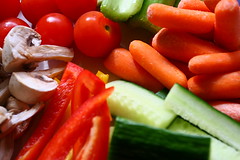My family has been increasingly consuming organic produce because we are trying to eliminate all food additives, preservatives and pesticides from our diet. If you are trying to feed your family the recommended five servings of fruit and vegetables a day, you may be spending more than you would like on produce, regardless if you buy organic or not. Just for my family of 5, meeting the USDA dietary recommendations means feeding us 25 servings of fruits and vegetables a day, or 175 servings a week! Here are steps you can take now to save money this summer on fresh produce:
Grow a garden. If you have the space, consider growing your own garden. You will have an abundance of fresh, organic produce growing in your back yard, and food doesn’t get any fresher than that. Eliminate the chemicals and the long transportation time that your produce often endures to get to the grocery store shelves.
 If you live in the city or don’t have room to grow a garden, consider getting a plot at a community garden. Community gardens are designated locations that usually have 15 to 40 plots available for members of the community to garden. You use a plot and plant what you would like. You just have to agree to maintain your plot and water it at least once a week. There is often a small fee. The community garden I plan to use this summer charges $20, but that money is refunded at the end of the season if you have tended your garden throughout the season.
If you live in the city or don’t have room to grow a garden, consider getting a plot at a community garden. Community gardens are designated locations that usually have 15 to 40 plots available for members of the community to garden. You use a plot and plant what you would like. You just have to agree to maintain your plot and water it at least once a week. There is often a small fee. The community garden I plan to use this summer charges $20, but that money is refunded at the end of the season if you have tended your garden throughout the season.
Subscribe to a CSA. CSA stands for Community Supported Agriculture. Many CSAs offer organic produce and deliver it to a location near you every week. Programs often let you choose between a 1/2 bushel and a bushel of produce weekly or every other week and typically run for 18 to 22 weeks.
In return, you must pay for your share upfront, usually before May. In larger cities CSAs fill up quickly, so you may want to begin looking for a CSA in your area this month or next month. You also usually are not given much say in the produce you receive, so being open to trying new vegetables is necessary.
Freeze Your Excess. If you have grown your own garden or have a share of a CSA, you may find yourself with an abundance of fresh produce during the summer months. Rather than letting it go to waste, consider preserving some of it. True, you could can some of it, but I have done that before, and it was a miserable time. (This is just my experience; you may enjoy canning.) Instead, take advantage of your freezer. Shred the excess zucchini and put it in the freezer in small bags. Puree excess squash to sneak into baked goods during the winter. Make Jamie Oliver’s pasta sauce and freeze it for future spaghetti or pasta meals.
With careful planning during the rest of the winter months, you will be able to not only enjoy fresh produce during the summer and slash your grocery bill, but you will be able to save some of that produce for the fall and winter months, effectively lowering your grocery bill for produce all year long.
photo credit: Martin Cathrae
Melissa is a writer and virtual assistant. She earned her Master’s from Southern Illinois University, and her Bachelor’s in English from the University of Michigan. When she’s not working, you can find her homeschooling her kids, reading a good book, or cooking. She resides in New York, where she loves the natural beauty of the area.
